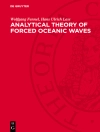Large-scale winds and currents tend to balance Coriolis and pressure gradient forces. The time evolution of these winds and currents is the subject of the quasi-geostrophic theory.
Chapter 1 presents concepts and equations of classical inertial fluid mechanics.
Chapter 2 deals with the equations of thermodynamics that close the governing equations of the fluids. Then, the motion is reformulated in a uniformly rotating reference frame.
Chapter 3 deals with the shallow-water model and the homogeneous model of wind-driven circulation. The chapter also describes a classical application of the Ekman layer to the atmosphere.
Chapter 4 considers the two-layer model, as an introduction to baroclinic flows, together with the concept of available potential energy.
Chapter 5 takes into account continuously stratified flows in the ocean and in the atmosphere.
Содержание
Basic continuum Mechanics.- Kinematics of continua.- Dynamics of fluids.- Basic geophysical fluid dynamics.- Constitutive equations.- Internal gravity waves in adiabatic and frictionless fluids.- Rotating flows.- Large-scale flows.- Quasi-geostrophic single-layer models.- Shallow-water model.- Homogeneous model.- Quasi-geostrophic two-layer model.- Basic QG equations for the two-layer model.- Energetics of the two-layer model.- Quasi-geostrophic models of continuously stratified flows.- QG continuously stratified flows in the ocean.- QG continuously stratified flows in the atmosphere.
Об авторе
Dr. Fabio Cavallini has more than 35 years of experience in oceanography. He is specialized in numerical modeling, theory and data processing in oceanography, ecology, hydrology as well as seismic and electromagnetic wave modelling.
Dr. Fulvio Crisciani is lecturer at the University of Trieste (Italy). He has more than 25 years experience in oceanography and is specialized in geophysical fluid dynamics and the climate of the gulf of Trieste.












